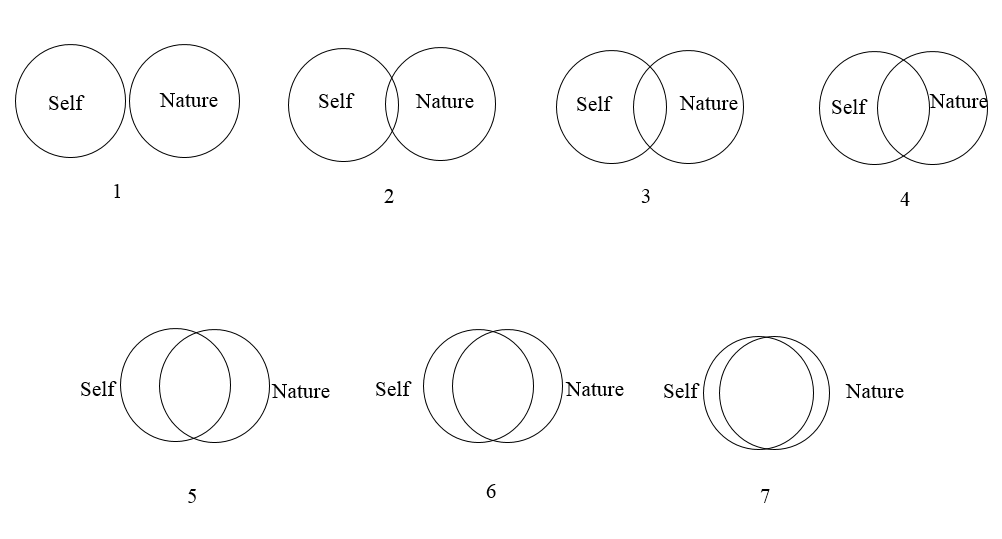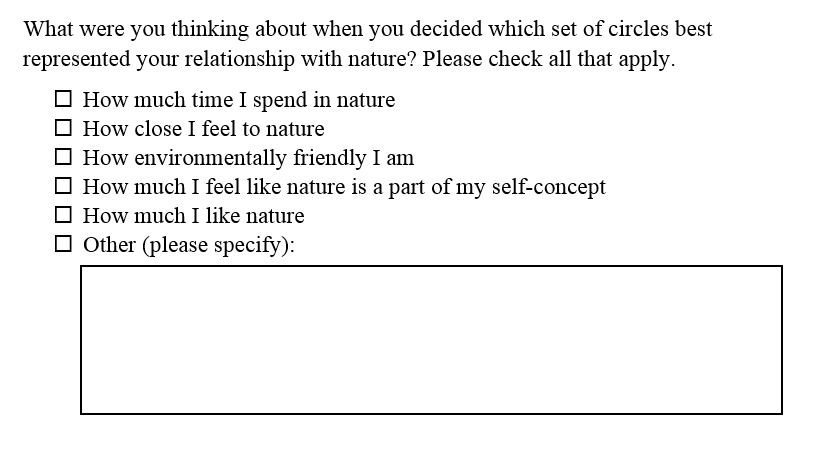Blog

The Biophilic Mind: How close do you feel to nature?
How close do you feel to nature?
This may seem like an odd question, but human-nature connectedness is vital to understanding how people relate to nature. We often assume that if people feel more connected to nature, they would treat it better—after all, if you feel a connection to someone or something, you would not treat it like it was disposable. In fact, several studies have found that feeling close to nature is associated with more eco-friendly behaviors (see this journal article or this journal article for examples).

In a psychological sense, feeling close or connected to someone or something usually means that you feel a mutual sense of understanding or that your sense of self is informed by that person or thing. But how can you measure something as subjective as a feeling of connectedness?
Researchers have studied closeness in human-to-human relationships in many ways, and there are benefits and drawbacks of each way of measuring closeness. Many researchers simply ask directly “How close do you feel to nature?” and have answered using a scale ranging from “Not at all close” to “Very close” (see here for an example of a study that uses a variation of this method). The benefit of this approach is that it is what psychologists call face valid, which means that it measures the concept of closeness to nature directly by asking about it in plain language. A question has high face validity if it can be taken at face value that it measures what it claims to measure. For example, a highly face valid way of measuring relationship quality is asking someone to rate the quality of their relationship—it is obvious that this question measures relationship quality because those are the exact words used. However, you might wonder if people are actually aware of and able to report on their relationship quality when asked directly. People may be motivated to present their relationship as better than it is, or perhaps they never thought about it and therefore cannot rate it accurately.
A similar problem exists when trying to measure connectedness to nature—are people explicitly aware of and able to accurately report on those feelings? This is a problem with highly face valid self-report questions because it requires trust that people are able to accurately report their own feelings about nature when asked.
One very popular way of measuring closeness that does not have these drawbacks is called the Inclusion of Other in the Self scale (IOS), which comes from a 1992 paper. This scale was modified to measure closeness to nature by Schulz and looks like this:

For this method, respondents are shown this set of gradually overlapping circles and told to interpret the circle labelled “Self” as representing them and the circle labelled “Nature” as representing the natural world. Respondents are asked to pick the set that best represents their relationship with nature.
The benefit of using this kind of measure (or even a modified version, found here) is that it helps people visualize themselves in relation to nature more easily than the more direct, highly face valid method of simply asking. The overlapping circles help guide our mental models of this kind of relationship, which might make it a more accurate way of measuring closeness to nature.
A potential drawback of this method is that interpretation of these circles can be widely different—something like this is entirely subjective and we do not know if people are using the same criteria when they pick a set of circles.
To better understand how people think about these circles, we at Phipps conducted a mini-survey during Science Engagement Week in September. We placed a tablet with a link to the IOS question and then asked respondents to report what they were thinking about when selecting a set of circles (participants were allowed to select more than one reason—see below).
Out of our (very small) sample of 10 people, 6 people selected the option “How much I feel like nature is a part of my self-concept,” 4 selected “How much time I spend in nature,”, 3 selected “How close I feel to nature,” and 2 each selected “How environmentally friendly I am” and “How much I like nature” as reasons.
These results from our informal poll show that people have many different reasons for feeling close to nature, some of which are based on subjective feelings and some of which are more concrete. The good news is that there is no evidence that these reasons matter much—the literature suggests that people who feel close to nature, regardless of the reason, tend to be more mindful and treat the planet better!
Go on outside and connect to nature, in whatever way is most meaningful to you!
Photo credits: Pixabay users jplenio, jameswheeler, & brenkee; IOS Nature from Aron, Aron, & Smollen, 1992


